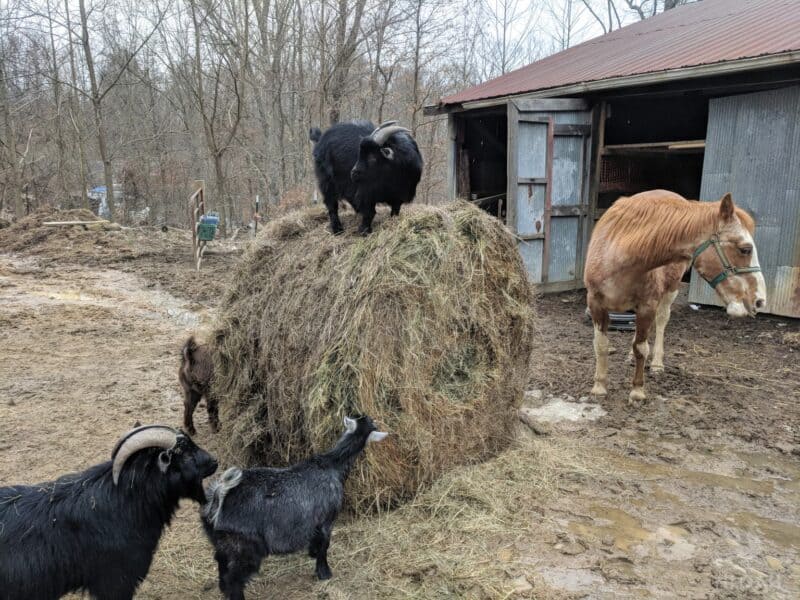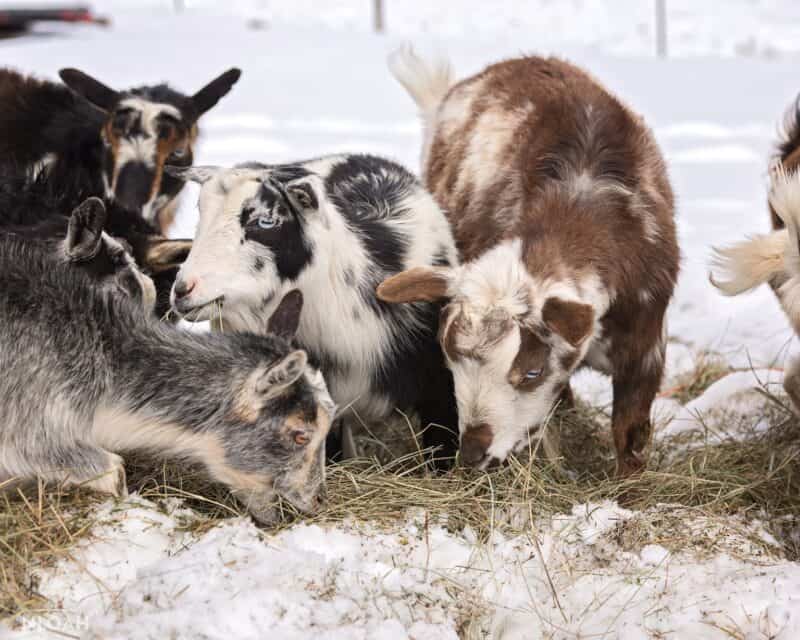For beginner and seasoned goat herders alike, choosing a staple food for your charges is a task that is often fraught with uncertainty. Goats can be surprisingly finicky eaters, and there is a lot to learn about the specific nutritional requirements of the species.

Some people plan on letting goats forage full time, only to find out that what grows locally is nowhere near nutritionally complete.
So much of the time, providing food for your goats is absolutely necessary. How about hay? Is hay okay for goats to eat?
Yes, hay is okay for goats to eat. Grass or legume hay should be chosen as a mainstay and tested for nutritional completeness. Vitamin and mineral supplementation may still be required, however.
You don’t need to be afraid when picking out hay for your herd, but you do need to know what their nutritional requirements are and how to choose the right kind of hay.
Then you have additional due diligence that must be done in the form of testing to ensure the nutrition is there.
It sounds like a lot to learn, but most the information is straightforward and easily understood, and I’ll tell you about the most important factors below.
What is Hay?
Hay is a type of dried feed that is made from grasses and legumes, which have been cut and allowed to dry in the sun with all parts of the plant intact, including the seeds.
Hay provides roughage and often serves as the main source of nutrition for animals such as horses and goats.
It’s important to understand that not all hay is created equal, so it’s important to choose wisely when selecting the hay for your herd.
Are Hay and Straw the Same Thing?
No. The terms are commonly used interchangeably by the uninitiated, but all livestock keepers and farmers know the difference.
Straw, unlike hay, is the dried stem of grasses or grains alone. Because it lacks nutrition, it shouldn’t be used as a feed source.
It is good bedding, though, and has a special advantage for goats because they usually won’t eat it assuming they have other, better foods- like hay!

What Kinds of Hay are Best for Goats?
Goats like all kinds of hay, but not all kinds of hay are good for goats on a fulltime basis. In all cases, hay should be chosen based on its nutrient content and quality: it should be free from mold, harmful plants, debris and so forth.
There are three main categories of hay but only two of them are suitable for goats to eat on a fulltime basis: grass hay, legume hay and cereal grain hay. Grass hays include timothy, brome, fescue orchardgrass and other common varieties.
Legume hays (which provide higher protein levels) include alfalfa, clover and lespedeza. Cereal grain hay is made from grains such as oats or barley and shouldn’t be fed to goats without significant caution because it can cause potentially fatal bloating.
Each and every kind of hay has its own advantages and nutritional profile, and it is important to keep in mind that this is just a guideline: the profile of a given hay can vary from season to season and even from cutting to cutting.
This means you must always get your hay tested if you want to be sure it is suitable for nourishing your herd! We’ll look at a few of them now…
Legume Hays
Legume hays are particularly high in protein, calcium and other important nutrients. They are an excellent choice for young, growing goats or lactating does because they offer the necessary nutrition for health and growth.
1. Alfalfa
Notes: Alfalfa is extremely nutritious hay, although it can be too rich for their sensitive digestive system in some cases. It has lots of protein, however!
| Crude Protein | Crude Fat | Crude Fiber | Total Digestible Nutrients |
|---|---|---|---|
| 18-20% | 2.5-3.5% | 24-26% | 60-62% |
2. Lespedeza
Notes: Lespedeza is a nice compromise between grass and legume hays. It still has plenty of protein but not as high as alfalfa, so it’s great for goats that are prone to digestive issues but still need the nutrition.
| Crude Protein | Crude Fat | Crude Fiber | Total Digestible Nutrients |
|---|---|---|---|
| 8-11% | 1.5-2.5% | 22-25% | 55-58% |
3. Clover
Notes: Clover is a great choice for goats with sensitive digestive systems because it’s lower in protein, but still packs a nutritious punch. It can be difficult to find clover hay!
| Crude Protein | Crude Fat | Crude Fiber | Total Digestible Nutrients |
|---|---|---|---|
| 5-7% | 1-2% | 24-26% | 55-60% |
Grass Hays
Grass hays are low in protein and tend to be higher in fiber than legumes. They’re great for goats that need fewer calories but still need their roughage, like adult bucks or senior does.
1. Timothy
Notes: Timothy hay is a popular choice among goat owners. It has plenty of fiber and some protein, but won’t be too rich for their digestive systems. A dependable all-around choice for most goats.
| Crude Protein | Crude Fat | Crude Fiber | Total Digestible Nutrients |
|---|---|---|---|
| 7-9% | 1-2% | 25-30% | 57-62% |
2. Orchardgrass
Notes: Orchardgrass hay is a common choice for goats because it’s an easily digested grass hay with plenty of nutrients.
| Crude Protein | Crude Fat | Crude Fiber | Total Digestible Nutrients |
|---|---|---|---|
| 8-10% | 1-2% | 24-26% | 58-62% |
3. Fescue
Notes: Fescue hay is similar to orchardgrass in terms of nutrition, but it can be coarser and more difficult for some goats to digest. It’s still a good choice if you can find it!
| Crude Protein | Crude Fat | Crude Fiber | Total Digestible Nutrients |
|---|---|---|---|
| 8-10% | 1-2% | 24-28% | 56-60% |
4. Brome
Notes: Brome hay is a grass hay that contains higher levels of protein than other varieties. It can be difficult to find, but if you can it’s a great choice for goats that are eating predominately grass and need a boost of protein.
| Crude Protein | Crude Fat | Crude Fiber | Total Digestible Nutrients |
|---|---|---|---|
| 7-9% | 1-2% | 25-30% | 55-60% |
5. Bluegrass
Notes: Bluegrass hay is another good choice for goats. It’s slightly lower in protein and nutrients than other grasses, but still provides plenty of fiber.
| Crude Protein | Crude Fat | Crude Fiber | Total Digestible Nutrients |
|---|---|---|---|
| 5-6% | 1-2% | 25-28% | 43-46% |
6. Bermuda Grass
Notes: Bermuda grass hay is a yet another great choice for goats that need extra protein, but still have sensitive digestive systems.
| Crude Protein | Crude Fat | Crude Fiber | Total Digestible Nutrients |
|---|---|---|---|
| 8-10% | 1-2% | 24-28% | 53-57% |
7. Annual Ryegrass
Notes: Annual ryegrass hay is higher in protein than other grasses, but still lower than legumes so it won’t be too rich.
| Crude Protein | Crude Fat | Crude Fiber | Total Digestible Nutrients |
|---|---|---|---|
| 11-13% | 1.5-2.5% | 22-24% | 55-60% |
There you have it, several solid hay options to feed your goats. But there is still more to know!
Is Alfalfa Hay Safe for Goats?
Alfalfa hay can cause issues for goats if fed in large quantities as it’s high in protein and calcium. Excess protein and calcium can cause health problems in goats, particularly urinary calculi, also known as “water belly”.
Urinary calculi are caused when excess calcium and protein form crystals in the goat’s urinary tract, which can block the flow of urine and cause serious health issues.
This condition is most common in young, male goats that are castrated. Symptoms include a swollen belly, difficulty urinating, and signs of pain.
To prevent urinary calculi in goats, it’s important to limit the amount of alfalfa hay in their diet, particularly if the hay is high in protein or calcium.
Is Timothy Hay Safe for Goats?
Yes. Timothy hay is safe for goats when given in moderation. It provides plenty of fiber and some protein, but won’t be too rich for their digestive systems.
Plus, it’s less likely to cause urinary calculi than alfalfa hay since it has lower levels of protein and calcium.
What Kind of Hay is Best for Male Goats?
When it comes to feeding a male goat, the best kind of hay to give them is grass hay. This includes types such as timothy, orchard grass, or brome.
What Kind of Hay is Best for Female Goats?
The best kind of hay to feed a female goat is also grass hay, such as timothy, orchard grass, or brome. Like male goats, alfalfa hay can be given to female goats but only in moderation.
In fact, female goats should be given less alfalfa hay than males, as it can cause issues with pregnancy and lactation if given in excess.
How Can You Tell if Your Goats Like Their Hay?
You’ll know because they eat it! Goats are surprisingly picky about their food, and will reject hay that they don’t like.
How About Straw? Is Straw Safe for Goats?
Yes, straw is safe for goats to eat but it has precious little nutritional value. In fact, straw is mostly used as bedding for goats, rather than a food source.
How Can You Tell if Your Goat Needs a Different Hay?
You’ll know if they aren’t eating it, or if they are eating it and don’t seem to be thriving. Different, more nutritious hay might be needed, or you may need to supplement their diet.
Don’t Forget the Vitamin and Mineral Supplements
Speaking of supplements, goats need them! Goats need a variety of vitamins and minerals in order to stay healthy, grow and produce milk.
Make sure you provide your goat with the necessary vitamins and minerals, either through their hay (guaranteed by testing!) or, more likely, through an added supplement.
That is a whole article by itself, but for now just remember that hay alone is not enough!
Tom has lived and worked on farms and homesteads from the Carolinas to Kentucky and beyond. He is passionate about helping people prepare for tough times by embracing lifestyles of self-sufficiency.
